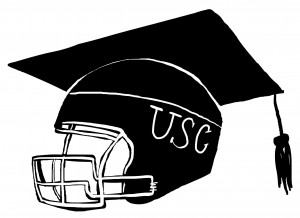USC provides students more than football
Last week, the NCAA Infractions Appeals Committee definitively sealed the fate of USC’s football program for the next few years, upholding the penalties originally handed down last June.
The university issued a statement saying it “respectfully, but vehemently” disagreed with the “imposed penalties … that were excessive and inconsistent with established case precedent.”
The ruling is certainly disappointing for die-hard Trojan fans, faculty, alumni and students who want to see the team return to its days of bowl game glory. Some students will graduate with the 2009 Rose Bowl and lackluster 2010 Emerald Bowl as their only postseason football memories.
For those outside the USC bubble, it’s natural to deem this university a “football school.” The sanctions present an opportunity for the university to shake off that stereotype. As an academic institution rich in scholarly history, social diversity and athletic success in many programs aside from football, USC continues to thrive.
Students attend USC for a well-rounded college experience, not just for a college football experience. One is bound to get involved in something aside from Saturday tailgates, whether its music and performing arts, community service, intramurals or one of many other weekend activities.
The school’s national image, however, seems permanently wedded to its reputation for football excellence and the next few years of sanctions should allow for USC to be taken more seriously in the upper echelon of the higher education system.
President C. L. Max Nikias helped catapult the school in a new direction in his first year as president with unprecedented fundraising, including the establishment of the Mork Family Scholars Program with a $110-million donation. Last month Nikias told Bloomberg News the school might raise $1 billion by September and announce another fundraising campaign that same month. Although Tommy Trojan is the emblem of USC, Nikias makes a sweet sidekick.
In April, the university announced that it would move to the Common Application system next fall. The pool of applicants is sure to increase and the admissions rate will take a dip with an increase in competition.
Consistently ranked among the top-25 universities in the country, the campus houses some of the leading undergraduate and graduate programs in the United States, including education, film and engineering. In 2010, The Daily Beast named USC the “hottest college” of the 21st century, and though it sounds like a superficial title, it signifies USC’s growing presence, academically and athletically, in the country.
And even without factoring football into the equation, many of USC’s NCAA Division-I athletic teams are highly touted. The men’s tennis team won its third national championship in a row last week, and Steve Johnson won the NCAA men’s singles title. Men’s water polo won its third consecutive championship last December, while the women’s volleyball team made it to the Final Four.
Students have much to be proud of in this flourishing corridor of Los Angeles, and football games should only add to its enjoyment. Next fall when we make the trek to the Coliseum, we shouldn’t only root on our players. USC gives us much to be proud of, and a football record should not define its measure of success.
Melissa Caskey is a senior majoring in print and digital journalism.


Right on Melissa! Time for a paradigm shift with regards to the perception of USC! Good article!